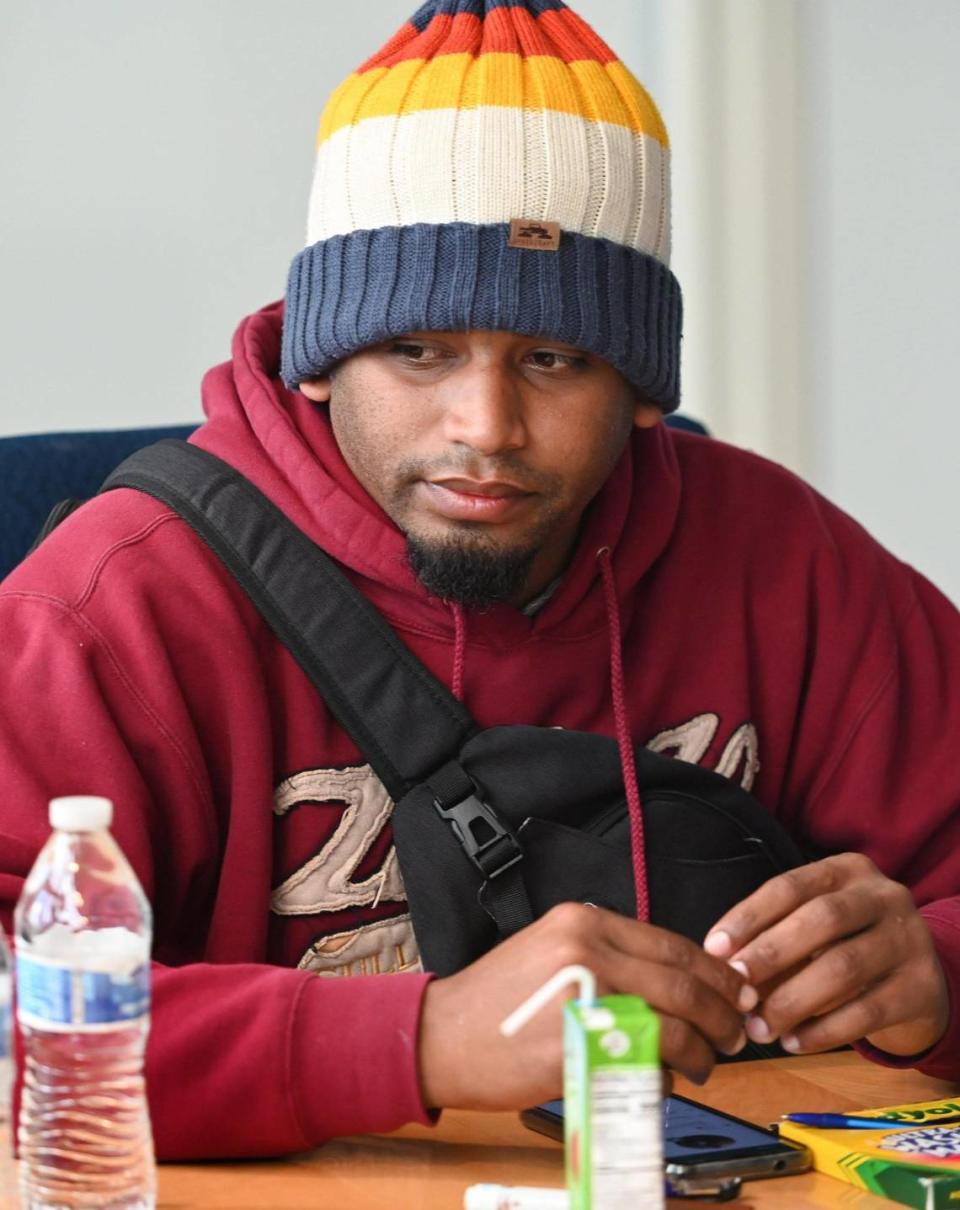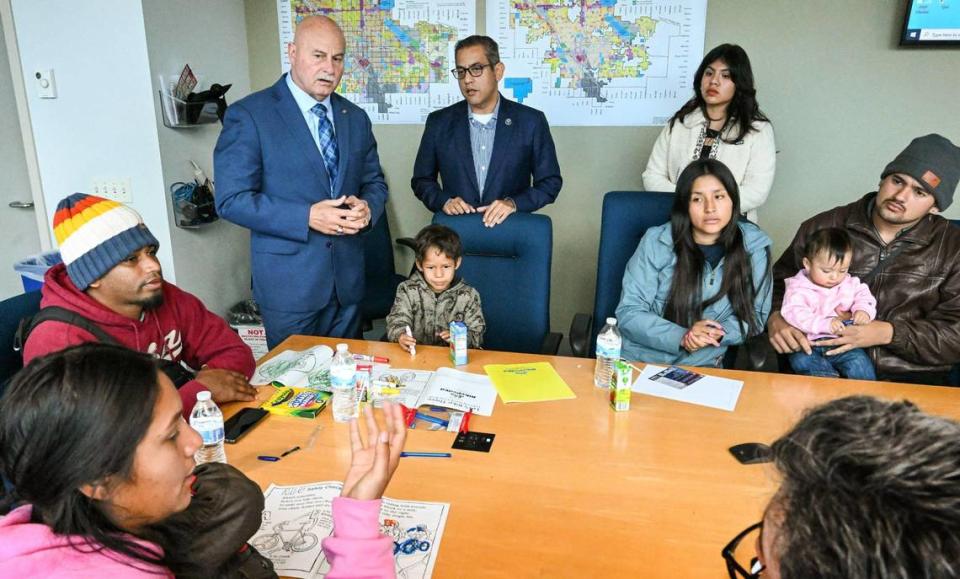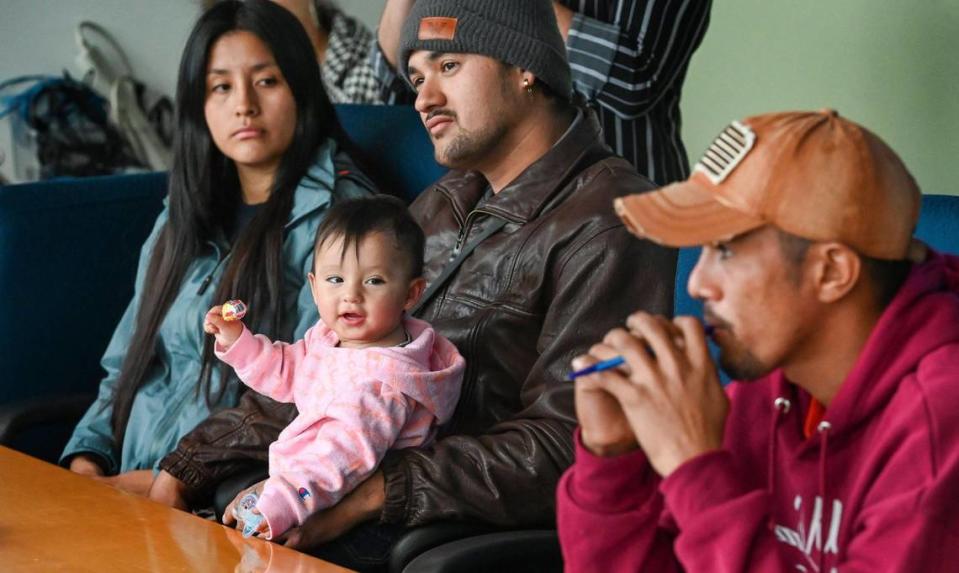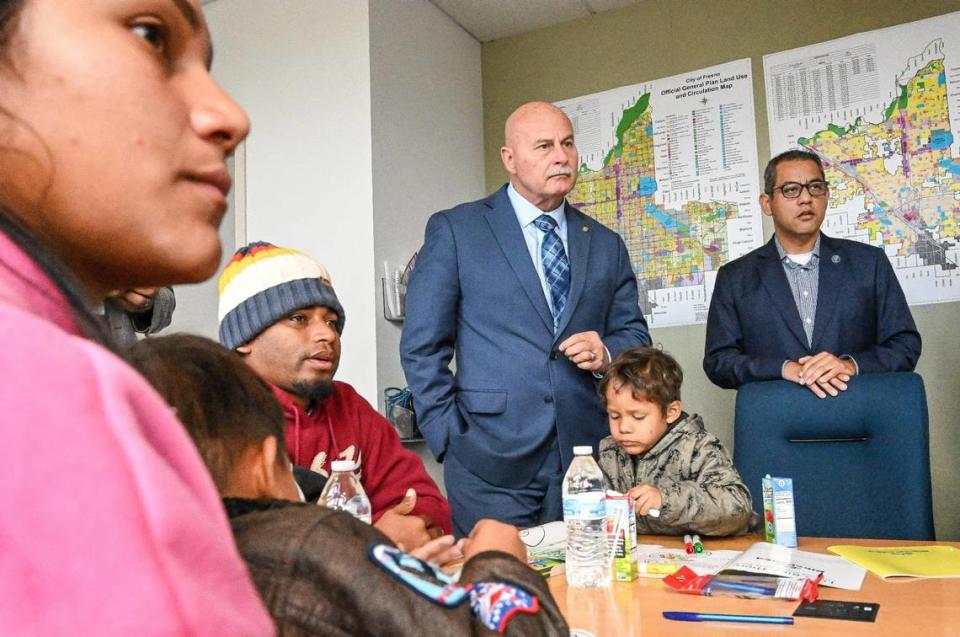Asylum-seekers bused to Fresno from Texas trekked 5,000 miles; faced jungles, danger
- Oops!Something went wrong.Please try again later.
Inside a cramped conference room at Fresno City Hall, a couple from Peru with their 10-month-old daughter recounted the arduous 2 1/2-month trek that took them from Lima to the U.S./Mexico border.
“We crossed nine countries from Peru,” Jose Morales, 25, told The Fresno Bee in an interview and speaking through an interpreter. He was interviewed along with partner Katherine Rojas, 23, as she held their daughter Danna.
The family are among nearly 20 people – all but one originally from Venezuela – exported by bus out of Texas and eventually to Fresno after seeking asylum in the United States. The immigrants were sent first to Denver, and then dropped off in Fresno last week. They and the others, including two other families and a collection of adults, find themselves caught in a political crossfire between Texas Gov. Greg Abbott and the Biden administration over immigration and border policy.
Their 21/2 month path took them through Ecuador, Colombia, Panama, Costa Rica, Nicaragua, Honduras, Guatemala and Mexico before they arrived at Ciudad Juarez, across the Rio Grande from El Paso, Texas, where they surrendered to U.S. immigration officials and applied for asylum.
The Associated Press reported recently that since 2022, Texas has sent more than 100,000 migrants to Democratic-led cities and states to cope with surging numbers arriving at its border with Mexico. The state reportedly has contracts with multiple bus companies to send asylum seekers out of Texas.
The state-sponsored shuffle of immigrants by Texas marks only the latest pieces of a long ordeal for Rojas and his family and the other people who arrived in Fresno with no place to stay.
An exhausting, dangerous ordeal
While the family was able to find bus transportation in some of the countries, if they had money to pay for it, for much of the journey they were on foot, including through jungles and rain forests in Colombia, Panama and parts of Mexico.
“You see everything. You see people who die, people who become dehydrated, people who twist their ankle, break an arm, fall because they are exhausted,” Morales said. “I mean, it’s a very dangerous place. It is a jungle. There are snakes and animals.”
“At least there in the jungle of Colombia, you feel a little safer – a little, very little – but mostly because if something happens to you, the Colombians who are there will help you, …” he added. “You arrive in Panama, there it is riskier. You don’t have anyone to help you if you sprain an arm, a foot, you can’t walk. You stay there; that is, you die there. I mean, it’s something like that. But equally in the water, if you were getting wet in the river, a snake or something bites you, you stay there. I mean, it’s risky.”
“Sometimes it was like they robbed people and abused women,” Morales said. “I was scared all the time. I stayed awake, mostly for my family.”
In Mexico, another concern was the danger of kidnappings by cartels. “There in Mexico and in all those countries we walked, it was with fear, looking to the sides, cared for my daughter and my partner, …” he said. “I really didn’t know all that was to happen. But I am the head of the home and I have to be a pillar for them and always be there for my family.”
Why leave?
In Venezuela, Morales worked in various jobs, including security, construction, welding, carpentry and cooking. He left because of government corruption, gang violence and drugs, and because the economy was in decline. “There was no work anymore,” he said. “There was no longer anything to eat there.”
He initially migrated to Peru, “but I didn’t have papers and it was difficult to get a job, and there was a lot of xenophobia,” he said. “There are a lot of problems for Venezuelan immigrants in Peru, so I decided to leave.”
He returned to Peru to reunite with Rojas, who was expecting their baby. Rojas owned a restaurant in Lima, “but right now, economically, prices have risen a lot; everything is very expensive,” she said. “I already had a food business, but it was no longer profitable because costs went up, the menu went up, so people no longer wanted to pay.”
Criminal gangs would also shake down businesses. “If you didn’t pay them a daily or weekly quota, they would bomb your business,” Rojas said. “We had already suffered.”
The Morales family originally started off from South America as part of a large caravan of about 1,000 people when they left in late September. By the time they reached the U.S./Mexico border in mid-December, the group had fragmented.
Along the way, Morales occasionally washed cars to earn money for food or to pay for bus or train tickets for the family.
What happens now?
In Texas, the migrants were offered three choices for where they could go: Denver, New York or Chicago. Morales said he initially chose New York because he had a friend there. But when he could not make contact with that person, they decided to go to Denver instead.
Once in Denver, however, aid organizations said they were unable to provide the help the families needed and made arrangements to pay for bus tickets to California. The migrants were told they were going to Indio, in the Imperial Valley of Southern California, “but there was a problem with the bus tickets and we were sent to Fresno,” Morales said.
All of the migrants received court dates for their asylum hearings while they were still in Texas. For some, like Morales, that date is later this year. For some others, hearings won’t happen until sometime in 2027, leaving them in limbo and uncertain about their ability to earn a living.

Their hearing locations are also scattered across the country. Morales’ hearing is scheduled for October in New York, but he said he hopes to have it moved to California to avoid having to be bused somewhere else in the U.S.
Even though they knew nothing of Fresno, they hope to remain as a family. “We don’t want to keep moving, to move again,” Morales said. “We want to stay here to have stability and to be able to transfer the case from New York to here.
“We are no longer looking to go from here to there because it is difficult, primarily because of the baby,” Rojas added.
Back to El Paso?
Fresno leaders, however, have other hopes. Mayor Jerry Dyer expressed his desire to provide short-term stabilization and services for the immigrants, but that ultimately his goal will be for them to return to Texas to continue the formal immigration process.
“It is our hope that we can facilitate the delivery of those folks to El Paso as soon as possible,” he told reporters Friday afternoon. “I don’t know if it’s a week or two weeks or beyond.”
Since Thursday night, the city has scrambled to find places for the immigrants to stay, and the people are being lodged at a local motel through this weekend.
City Councilmember Miguel Arias and Mayor Jerry Dyer said Friday that Fresno County’s Department of Social Services will begin taking the lead in dealing with the immigrants and coordinating a range of services including health screenings, food assistance and more.
In a hectic gathering in a City Hall conference room on Friday, representatives of various organizations and agencies met with the immigrants to begin assessing their needs and resources that could be made available, including preschool for the four children in the group and adult education for the adults, and immigration counseling and legal services.

“This was thrust upon us,” Dyer said. “If he had had some notice from somebody, we would have been a little bit better prepared to receive them and go through a more organized process.”
“I can guarantee you that critics will be upset over the fact that services are being provided to them, even health needs,” Dyer added. “But I think that’s the humanitarian thing to do, while at the same time balancing that with accountability, and that accountability is that at some point they need to be transported back to El Paso so they can go through the legal process.”
The city doesn’t have the legal authority to put the immigrants back on a bus against their will and send them away, Dyer said. “However, we can – with their permission – facilitate the transportation of those folks back to El Paso. That is our desire.”
A GoFundMe page has been set up by Matias Bernal, executive director of the Educational Leadership Foundation, one of the organizations that met with the immigrants on Friday. Contributions can be made through the page at www.gofundme.com/f/help-families-seeking-asylum.
A broken immigration system
Dyer and Arias both said the situation that’s landed the immigrants in Fresno is a symptom of “a broken immigration system.”
“I don’t support what has been done in Texas by shipping asylum seekers all over the country,” Dyer said. “But I also understand the dilemma that they face in Texas as well as Arizona where there’s an influx of people coming into their states.”
The system for dealing with immigration “has been broken for many years,” Dyer added, “and there hasn’t been a wilingness on the part of the federal government to have comprehensive immigration reform to the degree that we need.”
Arias pointed the finger at Congress for inaction on immigration reform. “What’s missing in this equation is action from Congress, … Local governments are not equipped to deal with fixing the immigration system,” He said. “Ultimately, both parties have resulted in us having this crisis in our city and across the country.”
Dyer concurred. “In my opinion, both parties have failed for decades to fix our broken immigration system, and what we are now dealing with at the local level is the failure to act.”
But, Dyer added, “it is not our desire to allow asylum seekers to make their way into our community. There’s a legal process, and that legal process must be abided by.”
Arias indicated that the immigrants have done everything that they are legally required to do under the law. “All of the asylum seekers in Fresno today followed federal law to enter the country,” he said. “These folks followed the exact rules that exist in the current immigration law, which is you turn yourself in, submit an asylum application, be processed by Immigration, and follow your court hearing dates, and they’ve done that so far.”
“It’s our hope that we will provide them sufficient support so they can attend their court hearings and proceed with thelr legal status,” he added.


